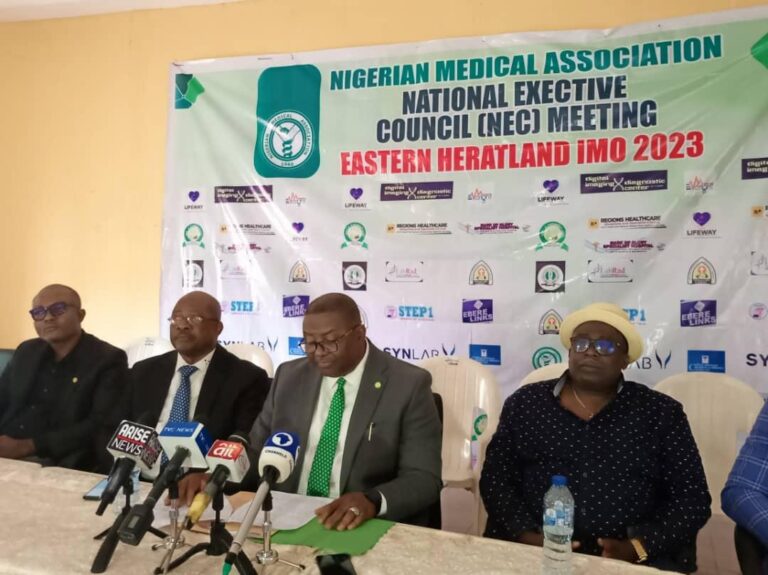News
Flood: NMA urges State, FG to take proactive approach to avert disasters

(L-R: The Imo Chairman of NMA, Dr Chidi Obiesi, NMA Secretary-General, Dr Jide Onyekwelu, President of NMA, Dr Uche Ojinmah and NMA National Publicity Secretary, Dr Peter Ekwueme at a news conference to end the 2023 National Executive Council meeting in Owerri on Sunday.)
The Nigerian Medical Association (NMA) on Sunday urged State and Federal Governments to activate emergency preparedness against the impending flood.
The President of NMA, Dr Uche Ojinmah, made the call while addressing newsmen on at the end the association’s National Executive Council (NEC) meeting held in Owerri between Aug. 27 and Sept. 3.
The News Agency of Nigeria (NAN) reports that the theme of this year’s NEC meeting is “Healthcare System in a Depressed Economy.”
NAN reports that the National Emergency Management Agency (NEMA) had said that some states are likely to be flooded, following the release of water from Lagdo Dam in Cameroon.
The states included Adamawa, Taraba, Benue, Nasarawa, Kogi and Anambra.
“The state governments, especially those in flood prone areas, should be proactive, desilt their drainages, and remove barricades on flood plains.
“We also advise Nigerians living in or close to low lands to move to higher grounds while pleading with governments at all levels to assist these our fellow citizens in relocating,” Ojinmah said.
The president also called on state and federal governments to quickly roll out palliatives for Nigerians to cushion the harsh effects of ravaging inflation with the attendant high food prices.
“We believe that between June and September, the palliative should have been rolled out.
“We insist that these palliatives should go to Nigerians and no longer a case of being stored in different warehouses,” he stressed.
He noted that the country’s economic base, which he claimed was not strong enough to withstand capital flight, was fanning the ambers of medical brain drain.
“NEC calls on government to ramp up efforts at stamping out wide spread insecurity in our country as a panacea for economic recovery and mitigation of medical brain drain.
“NEC thanks the Federal Government for the recent upward review of our consolidated medical salary structure, but we wish to point out that the agreement that was implemented from June 1 for upward review was finalised on May 25, which preceded the fuel subsidy removal and attendant escalation of inflation.
“NEC has directed her national officers to send our dear government a new demand for upward review of allowances while eagerly awaiting the review of minimum wage and consequential adjustment which we call on government to implement seamlessly,” he added.
Ojinmah commended President Bola Tinubu for “the huge confidence he has reposed in the medical profession by populating his Federal Executive Council (FEC) with medical professionals.”
He also congratulated all doctors appointed into FEC and all officers in appointive positions, especially the Minister of Health, Prof. Mohammed Pate, and the Minister of state for Health.
The NMA president expressed confidence that the association’s ambassadors at the Federal Executive Council will excel.
He called on other healthcare professionals to sheath their swords, saying that the association under his leadership was keen in building a progressive consensus for a better health sector.
Ojinmah expressed the gratitude of the association to Katsina, Osun, Sokoto and Cross River state governors for being doctor friendly and also improving the welfare of their health workers in their states.
He particularly commended Gov. Hope Uzodimma of Imo for “hosting of the NEC meeting and for graciously attending the opening ceremony with almost all the entire state executive council.”
“NEC directed the NMA Cross Rivers state to sustain the demand for the release of our abducted colleague, Dr Ekanem Ephraim.
“We call on the Government of Cross Rivers state to redouble her efforts towards securing the release of our colleague who has been in captivity for more than one month.
“We plead on the abductors to have mercy on the grandmother and release her; she has committed no offence than staying back in the country to take care of the citizens,” Ojinmah pleaded.
News
Woman killed while crossing road in Anambra

The Federal Road Safety Corps (FRSC), Anambra State Sector Command, has confirmed the death of a woman in an accident at Okpoko Market on the Asaba-Onitsha Road.
The Sector Commander, Mr Adeoye Irelewuyi, who confirmed the accident to journalists in Awka on Thursday, said that the woman was hit while she was crossing the road.
He said that the accident, which occurred on Wednesday, involved a commercial tow truck with registration number XA550BMA.
“Eyewitness report reaching us indicates that the truck was towing a vehicle in an uncontrollable speed along the axis.
“The vehicle that was being towed got detached from the tow truck.
“It hit and killed a female adult, who was said to be crossing the road, while the tow truck continued its movement.
“FRSC rescue team came to the scene and took the woman to Toronto Hospital, Onitsha, where she was confirmed dead and her body deposited at the hospital’s mortuary,” he said.
While sympathising with the family of the dead, the sector commander urged motorists, especially tow truck drivers, to exercise a high level of professionalism.
He also urged the drivers to always use standard equipment and avoid speeding.
News
LASG’s maize palliative impactful, says poultry association chair

The Chairman, Poultry Association of Nigeria (PAN), Lagos State Chapter, Mr Mojeed Iyiola, said the state government’s maize palliative to members of the association made a positive impact on the sector.
Iyiola said this in an interview with the News Agency of Nigeria (NAN) on Thursday in Lagos.
“We received about 150,000 tons of maize in February from the Lagos State government as palliative to cushion the effect of high feed prices.
“The major benefit of the palliative is that it actually cushioned the cost of production for most poultry farmers in the state.
“The palliative was beneficial as it made the cost of some poultry produce, especially eggs to drop,” Iyiola said.
He noted that prior to the palliative, a crate of egg was sold between N3,500 and N3,700 at the farm gate, but after the palliative, it now sells between N3,200 and N3,400.
According to the PAN chair, retailers and middlemen who sell from N3,800 to N4,200 do that for their personal gain.
“We have urged our members to sell their eggs at reasonable prices following the receipt of the palliative from the government.
“We appreciate the Lagos State government for the palliative but we also urge the federal government to do likewise, to further reduce the cost of production in the sector.
“This will consequently lead to drop in the prices of all poultry produce across board,” he said.
He said the palliative was shared among financial members of the association at no extra cost.
“As an association we shared the grains equally across PAN’s eight zones in the state equally. We also mandated each zone not the sell even a grain of the maize.
“We, however, considered new poultry farmers who wanted to the join the association as beneficiaries of the palliative,” said Iyiola.
He noted that through the palliative, more poultry farmers were recruited into the association.
“The maize was shared only to poultry farmers and not feed millers, it is the major component of poultry feed formulation,” he said.














